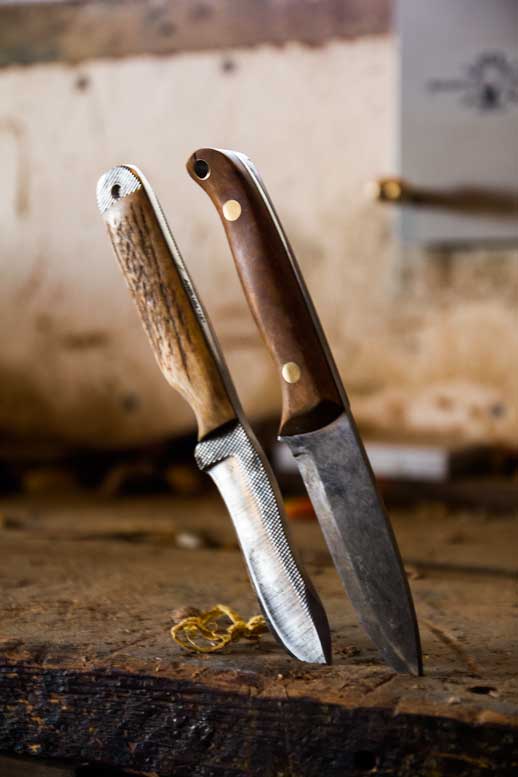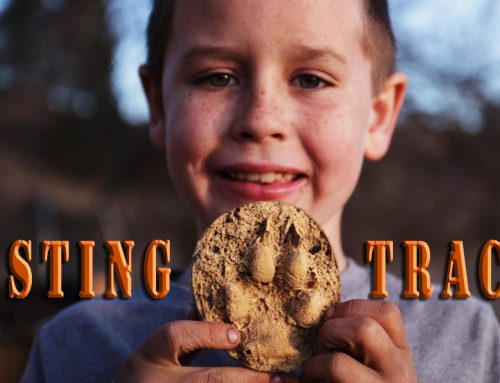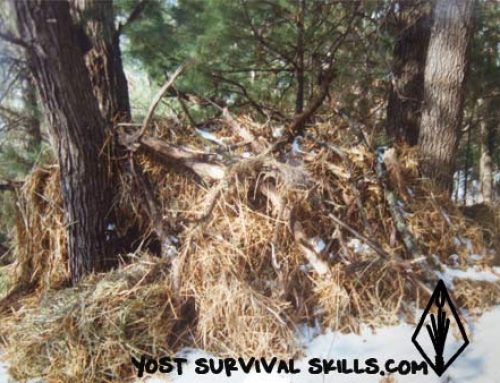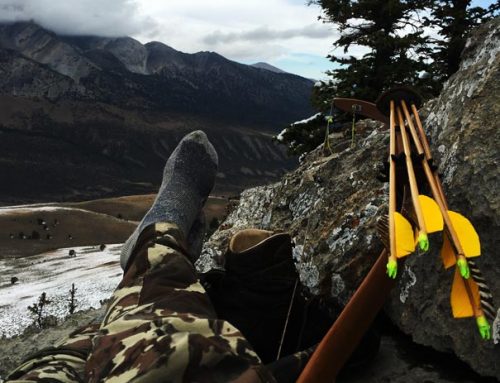Recently I came to a realization – not earth shattering by any means, and most people wouldn’t have given it a second thought. But, for me, it was a little jarring. At our little place in north Idaho we have a garden. We also have rabbits. And if a fellow expects to have a garden and rabbits he must, of necessity, have a fence. We’ve also got deer around the place but they don’t give us much trouble so far as the garden is concerned so our fence is a rather short affair. It’s a little less than 5 feet high I’d say – plenty to keep the lagomorphs at bay and not much of an obstacle for an agile young man like myself. I can hop right over it flat footed and that’s just what I’ve done for years since I built the thing. There is, of course, a perfectly functional gate leading into the garden but I’ve never used it much except for pushing a wheelbarrow in and out and so forth. Hopping over is just easier I guess, quicker maybe – who knows but that’s what I’ve always done.
That jarring realization I’ve come to… I’ve been taking the time to walk around and open that gate more lately. Now the average person might think, “well yea, that’s what it’s there for.” But in my slightly abstract way of thinking I came up with, “Hmm, is time finally catching up with me? I guess I’m not so young anymore but what does this really mean? If I walk through the gate instead of hopping over the fence will I soon lose that ability to hop? Will using that gate hasten the deterioration of my agility? It sure is easier to use the gate. But damn, the ramifications… what to do, what to do? ”
Ok, I concede, my way of thinking may be a little more than “slightly” abstract. But, nevertheless, the garden gate scenario got me to thinking about the decisions we make on a daily basis. We’re constantly tempted by little conveniences that are sure to make things easier, more comfortable, quicker. Next time you’re in the supermarket, take a look at what folks are putting in their buggies. You’ll most likely find that the vast majority of the contents are frozen pizzas, microwave dinners, and hamburger helper, or (insert quick and easy, just add water, microwave and viola meal here). I’d venture to guess that, presented with a full kitchen, fresh vegetables, spices, and an elk roast, most of these folks wouldn’t know where to begin. Maybe they’ve lost the ability to cook a proper meal or, more likely, they never knew how.
I was lucky enough to recently receive two fine knives in the mail. One is a “woodsman” style drop point from Chris Reade, the other a drop point skinner from Civilware. Both are of fine quality and craftsmanship. Handmade knives of carbon steel require a little maintenance. You must keep them oiled and honed and, like the model 61 Winchester 22 my grandfather gave me as a child, they’ll be around for generations to come. I’ve always been partial to a sheath knife. Maybe it’s the classic look and feel of them. And so I leaned to hone a blade freehand at a very young age, a skill that has served me well for more than 30 years; a skill that I’ll pass along to my sons.
A few months ago some friends were flipping through an outdoor catalogue when they came to a page showing a popular knife that uses disposable scalpel blades. My cousin has one and I used it to cape a bear he killed last year. It was certainly sharp and worked exceptionally well. But when it came time to touch up the blade my cousin just pulled out another foil wrapped scalpel blade, clipped it in place and threw the old one out. Well that was efficient. Easy as pie but, even though I couldn’t put it to words at the time, something just didn’t seem quite right about it.
In a recent editorial for Traditional Bowhunter Magazine, Don Thomas wrote about a policy change that recently occurred there. This issue contained an ad for GPS mapping software, something that they’d never allowed before (TBM is one of the very few magazines that maintains a high standard for advertisers). They’ve had a long standing ban on ads for high-tech gear but, as Don writes, things have changed. The change in policy had to do with the increasing difficulty of navigating the network of private/public lands and staying on the right side of the law while doing it. In this context, a GPS becomes not only an aid for navigating land, but bureaucracy as well. But what caught my eye wasn’t the justification of ads for GPS, but Don’s description of why he doesn’t use one. He recalls a story of how, while hunting with a friend in some flat, monotonous country they would stop to check their bearings every so often. Don, using nothing but dead reasoning and much to his friend’s surprise, was able to accurately indicate the distance and direction back to their point of departure. His friend was relying on a GPS. Don was able to do that because, as he explained, he didn’t carry a GPS and never has. He was relying on himself and his woodsmanship. He’d never allowed those skills to be eroded by succumbing to the easy accuracy of orbiting satellites.
We make choices every day, some are benign and some are only seemingly so. My cousin can’t sharpen a knife and his son won’t learn either. Don’s friend can’t navigate using his own internal compass. So, even seemingly benign choices have costs. Next time you’re confronted with your own garden gate take a moment and ask, “Do I really want to walk that way?”
Don’t forget to check out our latest project, Ascent. ch






My garden Gate was actually a pit for servicing trucks, about 5 ft high. By the time I was 40 I was using the stairs to go in and out 100% of the time. At 36 I was just starting to use the stairs occasionaly.
These are serious realizations which I speak about to those I come into contact with, whether hunting or otherwise, and it is refreshing to see the concept illustrated here; just one more reason to support Clay and his work…I would love to meet up with him someday…
Great Post!
Yep time catches up with us all, but we keep moving to keep what agility we can.
The mind is the greatest survival tool, keep using it to stay sharp
Old traditional ways is better than any new crap on the market.
The late Jay Massey said it best “Greed and laziness, however, is not without its price”.
Really good stuff Clay! I don’t like the quick and easy answer all the time either. It’s why I choose a stick without wheels rather than one with… it’s why I choose a chainsaw and logs I cut myself rather than a quick trip to the lumber yard.
That being said, I still like quick and easy sometimes. I do use a chainsaw rather than an axe and adz…
The world is different these days. Some things better, some not. Ultimately it’s all about choice.
I still jump the fence now and then,.. but the gate looks pretty good too.
Great thoughts!
Thanks!
I’m sure that I can still hop the fence at age 54, but I’ve lost so much hunting time over the years from being lost that I bought a cheap GPS. I still get turned around on our own farm that I’ve been walking on for 50 years. When I take my grandsons hunting, the 7 year old is wrong every time I ask which way the truck is and the 5 year old is right every time. I already know which one is hunting out west with me.
I love being out side. But at 61 the woods is harder. Arthritus makes it worse. So I move slower. I see more that way, I pay closer attention to what is around me and soak it in. I do not use anything but woodslore to get in and out. To enjoy God’s creation is the ultimate journey for me.
Clay,
Some really interesting thoughts. Thank you.
They inspired a couple of my own, from an older man’s perspective.
Hop the fence as long as you can; there’ll come, all to soon, a day when you start to hop and realize that the fence is now high enough to keep both you and the rabbits out. You’ll probably prolong your ability to hop it by continuing to do so, but someday you won’t clear it. That’s time enough for the gate. It’ll still be there.
Navigation by dead reckoning is a wonderful skill. Some can do it almost anywhere, some can do it where they’ve spent substantial time but some can’t really do it at all. The ability to do it fades with darkness, illness and injury. So while I highly recommend relying on dead reckoning if you’re good at it and in shape to do it, I also recommend compasses and GPS. If nothing else, learning how to effectively use those tools helps to keep your mind sharp. There is a tendency as we age to do what we’ve always done. Fight it – learn something new and when you’ve mastered that learn something else new. If you do, your chances of dying peacefully in the woods or at home, as opposed to in a nursing home dribbling pabulum down your shirt, go way up.
I discovered replaceable blade knives a little while ago. I find them to be very valuable tools for string making, serving, making string silencers and other such things that require trimming small pieces of very fine material without having to put a lot of pressure on it. So again, while I still sharpen most of my knives the old way, I find a valuable use for the new way. And when those blades are dull, I drop them in a bucket along with all of the other scrap metal my various hare brain projects produce and periodically take it to the recycle center to find a new life.
So at 70 what I’ve learned is that the old ways are valuable, but so are the new ones. And nowhere is it written that if you practice one it must be to the exclusion of all others. Learn everything you can, apply that knowledge when it’s appropriate, and keep your mind at least as active as your body. Keep hopping fences, both physical and mental, as long as you can.
At 72, most of my stuff is good enough If I dont have it by 72 I probably dont need it. My daypack is 1979 Kelty single pocket vintage as i needed something for an Alaska hunt….still has the old treebark fleece i hand sewed on it to make it quiet. My knives are same vintage. My Kelty rigid frame meat pack began packing elk meat out of northern Idaho Kelly Creek about 1962. My old bear razorhead broadheads are gone so now with Zwickey and Magnus 2 blades. They can all still miss
Clay, I think you’re actually touching on a couple different points here. 1) The inevitable process of aging. 2) Our unfortunate modern model of waste in a consumer society. 3) The use of a tool to make up for a lack of skills.
There’s no avoiding aging. We’ll all either get old or die young. But I am a firm believer in “use it or loose it”. It’s just a matter of striking a balance as our bodies change.
Disposable blades seems bit wasteful to me, but how many of us put our sandwich in a ziplock, use it once and throw it away? There are alternatives to just about everything we do. Again, it’s about striking a balance with what’s practical and what makes us feel good at night.
As for the GPS, being a mountain guide, I spend as many days in the mountains as just about any. I am convinced some people have a good sense of direction and some don’t. GPSs are just a tool, and those with good sense of direction can use that tool more effectively in the field than those without good direction. I could easily never use a GPS again, but the fact is that it is very helpful pinpointing specific locations. I believe that those with poor sense of direction will not necessarily get better at navigating by using a GPS. It’s just a tool, but if you lack the skills to do the job in the first place, the best tool in the shed will not help you.
Once again it’s all a balance. I don’t own an ATV or a compound bow. I hunt on foot with a recurve. But I did drive to the trailhead in my truck rather than ride my horse. I prefer the challenges and the experience of the of the choices I have made. Now, when it comes to leaping the garden fence, I’ll have to honestly asses it each day, because youthful enthusiasm, now that I’m in my 40s, has gotten me hurt a time or two when I wasn’t careful! And I’d prefer to be around several more hunting seasons rather than get sidelined trying to prove to myself that I could do something I always did in my 20s and 30s.
Thanks!
I enjoyed this read as it fits my beliefs rather well. Just this morning I replied to a question on an outdoor forum. The question was what kind of knife you carry and why. Same goes with a gps I received years ago that has sat on my shelf ever since. When I shot a compound bow why I chose a fixed blade rather than a mechanical with replaceable blades. People ask me why I like shooting traditional gear. They state that its harder and I can’t shoot as far as their compound bow. Too me they have already got my answer with their question. Shoot straight!
I turned 49 this last summer and all the injuries from my misspent youth are starting to hurt when the weather changes… heavier now too from a career in an office. I raised my kids past 19 as of this year and decided now it is time to get out and spend more time in the field… kayak fishing and trad bow hunting… and I have found that a lot of the things I used to be able to do are a lot harder now, but the payoff mentally is higher in doing them. My time in the woods is valuable. I might not be able to cover as many miles as I used to, that’s okay. I haven’t broke down and sold out my values to setup a feeder or a deer stand or buy an atv. I hunt in a way that is meaningful to me and am finally understanding what Fred Bear meant about a good day not necessarily meaning I bagged anything. I am getting older, but with that age comes a peace in my inner understanding of remaining true to myself.
I read your articles in Traditional Bowhunter and I really enjoyed your Untamed video. At 62 I just am recovering from double knee replacement surgery; no fence jumping for me. Obviously I couldn’t bow hunt this past season so am using my recurves bow and Magnus Bullhead Broadheads to “hunt” and decapitate cleanly my free range chickens and Geese. The point is to at least somewhat address that hunting instinct and to cleanly kill the birds I’ve nurtured since their hatching days. I do not wish to traumatize them as usually occurs with store bought chicken before their deaths . I figure if I can decapitate a chicken with an arrow then I should likewise be able to cleanly kill deer and elk this next fall when I am once again able to walk normally.
Being a traditional Bowhunter and homesteader keep me in close touch with the realities of life and death on this planet where God has entrusted us as caretakers. I am certainly no vegan but am greatly distressed by the amount of environmental damage caused by much of contemporary agriculture so as a long term Environmental Scientist by profession and homesteader by obsession I try my best to walk the walk and not just talk the talk of true sustainable living.
Just because fences become un-hoppable doesn’t mean you are becoming a wimp nor does it mean your days or hunts are unsuccessful.For example I still find meaning in eating a chicken which although raised via free-range practices by me from the day of hatching I still oversaw it’s instant humane death via a decapitation broadhead and can savor the rich soup made with its flesh and feel truly blessed. I know no one else raised it, killed it, processed it or obtained retail profit from selling such a bird. It isn’t grouse or pheasant, but nevertheless its life and mine still have meaning and can and indeed have lead to many successful, “good days”. I’m sharpening my knife to butcher the chicken on a regular basis, no disposable blades for me, thank you.
[…] Check out some of our other Blog Posts here! […]